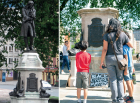Inclusion
Inclusion means that people with disabilities (special educational needs or specific learning difficulties) are entitled to the same access to the primary curriculum as people without them. In this section, you will find resources useful for improving inclusion across the primary history curriculum.
Sort by:
Date (Newest first) | Title A-Z
Show:
All |
Articles |
Podcasts |
Multipage Articles
-

Re-evaluating the role of statues
ArticleClick to view -

Recorded webinar: Exploring representations and attitudes to disability across history
ArticleClick to view -

Studying the Maya
ArticleClick to view -

Teaching Ancient Egypt
ArticleClick to view -

Teaching black British history through local archives
ArticleClick to view -

The world on the wall: exploring diversity on Hadrian's Wall
ArticleClick to view -

Three first-class ladies – teaching significant individuals in Key Stage 1
ArticleClick to view -

Towards inclusion: A study of significant figures and disability within the national curriculum
ArticleClick to view -

Ways of making Key Stage 2 history culturally inclusive: A study of practice developed in Kirklees
ArticleClick to view -

Whose history is it anyway?
ArticleClick to view -

World War I: widening relevance in the modern world
ArticleClick to view

